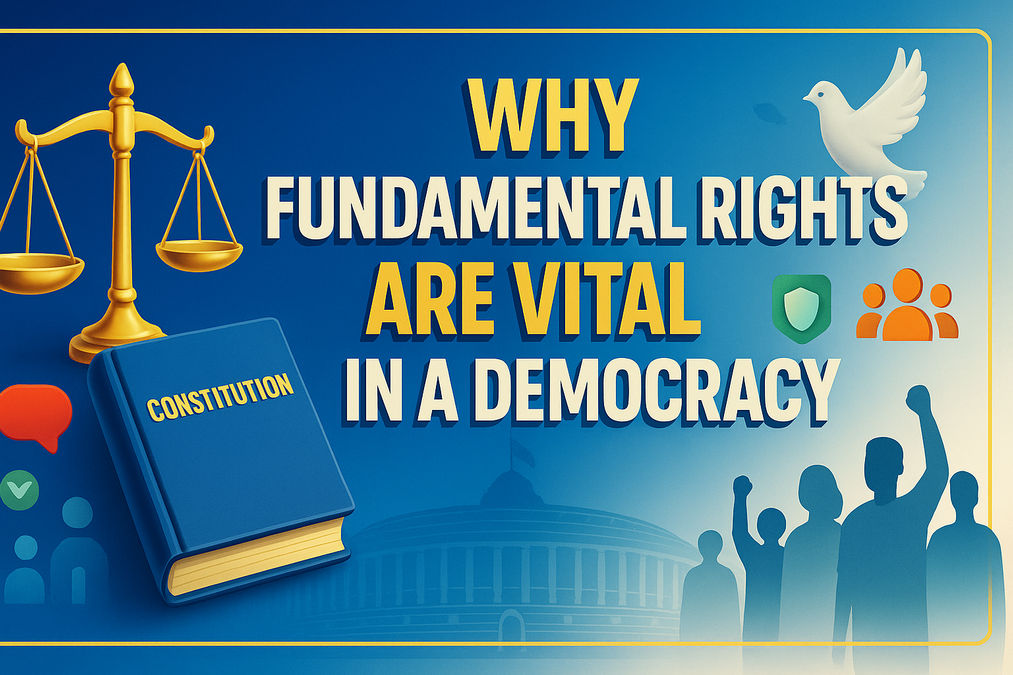Why Fundamental Rights Are Vital in a Democracy

Why Fundamental Rights Are Vital in a Democracy
Fundamental Rights in a democracy are the cornerstone of citizen empowerment, ensuring freedom, equality, and justice. In India, these rights, enshrined in the Constitution, protect individuals from state oppression and societal discrimination, making democracy meaningful.
"Fundamental Rights are the soul of democracy, giving every citizen a voice and dignity." - Unknown
The Role of Fundamental Rights in Democracy
Fundamental Rights in democracy serve as guarantees that protect citizens from arbitrary actions by the government or majority groups. They ensure that every individual, regardless of status, enjoys equal treatment and opportunities.
Timeline of Fundamental Rights Evolution
1947: Drafting of the Constitution
The Constituent Assembly began drafting the Constitution, prioritizing Fundamental Rights.
1950: Constitution Enforced
The Constitution came into effect, guaranteeing six Fundamental Rights to all citizens.
1993: NHRC Established
The National Human Rights Commission was set up to protect and promote human rights.
2009: Right to Education Act
Education became a Fundamental Right for children, ensuring free and compulsory education.
Key Fundamental Rights in India
| Right | Key Provisions |
|---|---|
| Right to Equality | Prohibits discrimination and ensures equal opportunity in public employment. |
| Right to Freedom | Includes speech, assembly, and movement, with reasonable restrictions. |
| Right against Exploitation | Bans human trafficking, forced labor, and child labor. |
| Right to Freedom of Religion | Ensures freedom to practice and propagate religion, subject to public order. |
| Cultural and Educational Rights | Protects minority rights to preserve culture and establish institutions. |
| Right to Constitutional Remedies | Empowers citizens to seek court remedies for rights violations. |
Protecting Citizens: Real-World Scenarios
Guantanamo Bay
Detainees lacked the Right to Freedom, highlighting the need for legal protections.
Saudi Arabia
Absence of political and gender equality shows the importance of Fundamental Rights.
Kosovo
Ethnic violence underscores the need for Cultural and Educational Rights.
"Rights without enforcement are like promises without action." - Anonymous
Enforcement of Fundamental Rights
The Right to Constitutional Remedies allows citizens to approach courts for justice. The judiciary, independent of the government, issues writs to protect rights. The NHRC investigates violations, while PIL enables public interest cases.
Frequently Asked Questions
Why are Fundamental Rights vital in a democracy?
Fundamental Rights ensure citizens' freedom, equality, and protection from oppression, forming the foundation of a democratic system.
How do Fundamental Rights protect minorities?
They prevent majority oppression by guaranteeing equal treatment and cultural preservation for minorities.
What happens if Fundamental Rights are violated?
Citizens can seek remedy through courts via the Right to Constitutional Remedies or Public Interest Litigation.
What is the Right to Constitutional Remedies?
It allows citizens to approach courts to enforce their Fundamental Rights, called the 'heart and soul' of the Constitution.
Can Fundamental Rights be suspended?
Certain rights can be suspended during a national emergency, except for the Right to Life and Personal Liberty.
What role does the NHRC play?
The NHRC investigates human rights violations and recommends actions to protect victims.
How does the Right to Freedom work?
It grants freedoms like speech, assembly, and movement, with reasonable restrictions for public order.
What is the significance of the Right against Exploitation?
It prohibits human trafficking, forced labor, and child labor, protecting vulnerable sections of society.
How do courts enforce Fundamental Rights?
Courts issue writs, directions, or orders to protect rights and can award compensation to victims.
What are some expanded rights in India?
Rights like the Right to Education, Right to Information, and Right to Food have evolved from Fundamental Rights.
Conclusion
Fundamental Rights in a democracy are non-negotiable, ensuring that every citizen enjoys freedom, equality, and justice. In India, these rights are a testament to the strength of its democratic framework.
Join the conversation